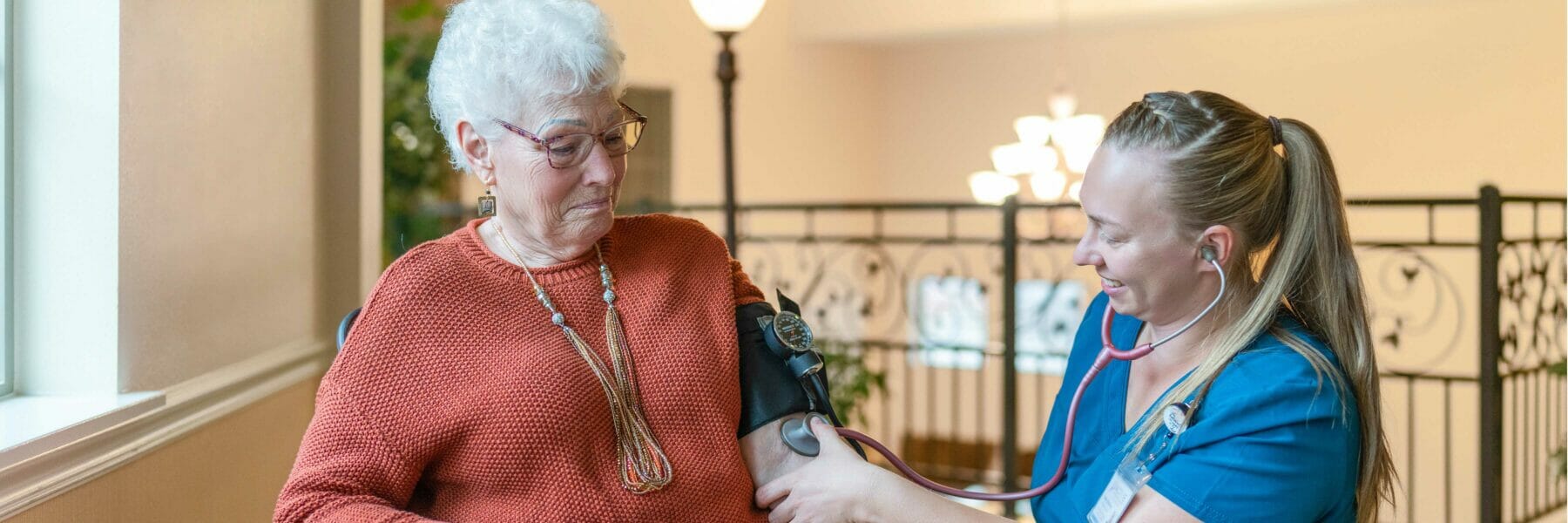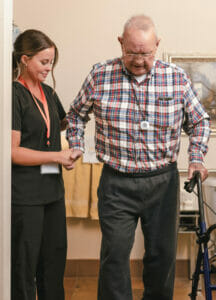
Home health services play an essential role in helping people stay independent and in their home longer. We review 12 of the most commons myths to help you better understand the truth about home health care.
When you think of the word home, what comes to mind? The word home often brings back fond memories of family. It brings feelings of comfort, love, and safety. For many of us, it is in our homes that our futures begin, and our hopes are realized.
No matter how you define it or what feelings or memories the word brings with it, one thing is clear. A home is much more than 4 walls and a roof. There is a deep emotional connection between you and your home. It should be no surprise than that almost 90% of people aged 65 and older want to stay in their home for as long as possible.
Home health services play a vital role in helping this dream become a reality for many people. As people age and their health conditions change, utilizing home health services is proven to slow a person’s decline, helping them to stay independent longer and avoid unnecessary hospitalizations or admissions to any number of long-term care institutions.
Despite the role that home health plays in keeping people independent longer, many people still misunderstand what home health is and when they might qualify for service. Here are 12 of the most common myths about home health and what you should know about them.
The 12 Most Common Myths About Home Health
Myth #1: Home Health is too expensive
Unlike most other decisions in life, you don’t have to worry about costs when considering home health. Most insurances, including Medicare, include benefits to provide home health services. These benefits cover the cost of services 100%. This means that there is no cost to you or your loved ones needing care.
Myth #2: The care I receive at home is not as good as the care provided in a skilled nursing facility or a hospital
Active Home Health employs a team of nurses, therapists, CNAs, and even medical social workers to help restore your active lifestyle from the comfort of your home. They are the same clinicians that would provide care during a hospital or skilled nursing facility stay. As such, you can rest assured that the level and quality of care you are receiving in your home is the same as you would receive from either of these other facilities.
Myth #3: Home health provides the same services as either personal care or home care.
These services, while both delivered from the comfort of your home, are very different from each other. Home health provides clinical care ordered by a health care provider. These services are focused on curative measures designed to restore or maintain your independence and health. Personal or home care assistance does not require any sort of physician order and involves non-clinical services, such as help around the house, transportation, bathing, and light meal preparation.
Myth #4: Home health is only for those without any family support
While family support is great when available, it in no way influences whether you qualify for home health services. Home health care, as ordered by your doctor, provides curative measures for a variety of diseases. Family can provide support and encouragement to help you complete the recommended treatments, but they are not a substitute for our clinical care team, neither can they replace the direct communication we provide to you or your loved one’s doctor.
Myth #5: Home health is only available after leaving a skilled nursing facility or hospital
While home health is often used in these situations, there are countless more scenarios where a person could benefit from the care provided by home health. Any number of conditions can qualify a person for the extra help provided by our team. Examples include behavioral management, fall prevention strategies, wound care, disease exacerbations, medication management, fluctuating vital signs, and so much more.
Myth #6: Home health is only for physical therapy
Physical therapy is only a fraction of the services covered under most home health benefits. The other services covered include skilled nursing, home health aide, speech-language pathology, occupational therapy, and medical social services. Any combination of these can be used to treat all types of conditions, ranging from a variety of rehabilitation programs to disease management and everything in between.
Myth #7: Home health is only provided to patients who are bedbound
A patient is required to be homebound to qualify for home health services, not bedbound. A patient is considered homebound if they cannot leave the home without considerable and taxing effort. There may even be situations where leaving the home is not medically advisable. Examples of being homebound include requiring the use of supportive devices, the use of special transportation, or when disease symptoms worsen when leaving the home. Even so, brief and infrequent non-medical trips outside the home, like going to church or special family events, are still allowed and do not unqualify a person for home health services.
Myth #8: Home health is only for those who are very sick
While beneficial, home health services are not only for those suffering from a serious or chronic illness. Whenever there is a reasonable potential for change or modification in a patient’s condition or treatment, home health can monitor these changes and prevent further complications. These changes in conditions may differ in severity. Regardless of the severity, we work with your doctor to make sure that any adjustments made, big or small, have the desired effects.
Myth #9: Home health isn’t safe
It can be difficult to let a complete stranger into your home, especially at a time when you are needing extra care and support. To ensure your safety and well-being, all our clinicians undergo extensive background checks and training. While they may seem like a stranger when they first start visiting you, we are confident that by the end, they will feel like an extension of your family.
Myth #10: Home health provides 24/7, around-the-clock care
While available to answer questions any time of the day, home health providers are not in the home 24/7. Each plan of care is customized to fit your individual needs. The severity of your condition and the doctor’s orders determines the number of visits per week. Often, visits are more frequent at the beginning of services and taper off towards the end as you regain your confidence, independence, and physical ability to perform your daily activities.
Myth #11: Home health can only be provided in one’s own home
Home health can be provided in almost any place that you call home, even if that place is temporary. That can be a family member’s or friend’s home, an assisted living facility, independent living community, or group home. The only place where home health is not available is at either a skilled nursing facility or a hospital. This is due to the fact that these locations provide the same level of care that is available through home health.
Myth #12: Using home health will cause me to lose my independence
Receiving care through home health actually helps you remain at home, avoiding unnecessary hospitalizations or admission to long-term care institutions. We focus on regaining or maintaining independence by promoting your optimal level of well-being and slow decline. The ultimate goal of home health care services is to help individuals monitor and treat an illness, injury, or unstable health condition before it leads to a more serious or debilitating illness.
 The Truth About Home Health
The Truth About Home Health
At Active Home Health, our services are designed to restore and improve your current health condition or level of function. We are committed to restoring you to your active lifestyle and independence, all the while helping you to remain in your home for as long as possible. As such, we tailor our care plans to fit your personal needs, goals, and abilities. We promise to help you achieve these goals through the combined effort of our registered nurses, therapists, CNAs, and you.
Thousands of people have used our services to help with a multitude of health conditions, each one unique in their needs and situations. Whether you need help monitoring and treating an illness or injury before it leads to something more serious or help improving your current level of function and independence, Active Home Health has you covered. Contact us today to see how our tailored care plans can help you or your loved one restore your active lifestyle and keep you safely at home for as long as you want.
Resources:


 The Truth About Home Health
The Truth About Home Health

